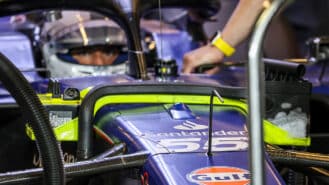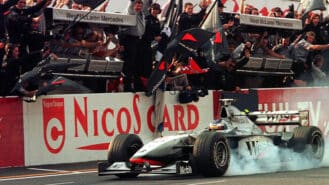Poor old Pirelli. They’re damned if they do, and damned if they don’t.
It was asked to make racing tyres that wear out more quickly, to spice up the show, and it delivered. That was a brave decision from a manufacturer of tyres for road cars. When you fit Pirellis to your hatchback, you want them to last as long as possible.
For a while, everyone seemed happy, impressed even, at the speed with which the company had got to grips (sorry) with the challenge of producing tyres for Grand Prix cars. We became used to a multitude of pit stops and ever since, the talk has been of nothing but tyres with various colours of writing on the sidewalls.

In the heat of the Bahrain desert last weekend the ‘tyre-talk’ reached fever pitch.
How many pit stops? How many laps would they last? Who had saved the most tyres for the race? Who was on softs, who was on mediums? And so it went on, ad nauseam, through the whole weekend at Sakhir. Frankly, I didn’t want to hear another word about tyres for at least three weeks.
Michael Schumacher, plodding round outside the points, seemed to agree. Or was I the only one who agreed with him? No matter, the man who has won the F1 World Championship seven times spoke out about the durability, or woeful lack of it, after the race. OK, you could say that if he’d won the Grand Prix he probably wouldn’t have delivered this speech. But that is hardly the point. What’s at stake here is the very essence of Grand Prix racing, what we expect of the sport’s highest level, and whether we are satisfied with the spectacle.

From the drivers’ point of view, it is not so much the spectacle that matters, but the challenge of winning a 90-minute race in the most sophisticated racing car in the world. Schumacher says the ‘tyre situation’ is no longer worthy of Grand Prix racing, that the races have become tyre-saving exercises, a kind of interrupted endurance run. Looking at the activity in the Sakhir pitlane, I had to agree with him.
Are they racing flat out? No, they are not. Are they using the full potential of the cars? No, they are not. Occasionally we are seeing the right tyre on the right car on the right day, and it wins. More often we are seeing absurdly rapid degradation, yet another pit stop, and another short sprint before the next set wear out. The Mercedes may not be the most efficient user of rubber but I do believe that Schumacher is making a wider point.

Over the years I have not often agreed with Michael Schumacher. And I have at times been dismayed by his tactics on track. But this time I believe he has a good point to make. Surely we want to see a race that is not governed by tyres, that is run without constant interruptions for rubber. There is a balance of course and we should not return to rock-hard tyres. But Grand Prix racing must now take a step back, review the rate of degradation, and settle on a less extreme strategy for mixing up the order. We want racing on the track, not in the pitlane, please.







